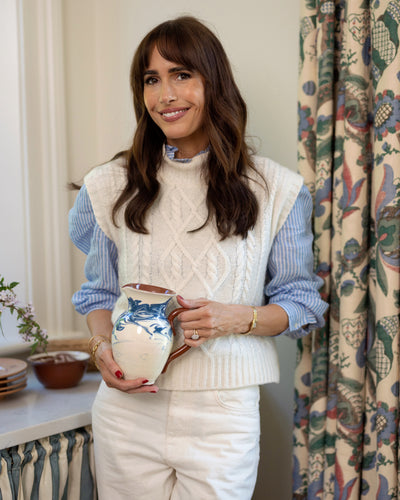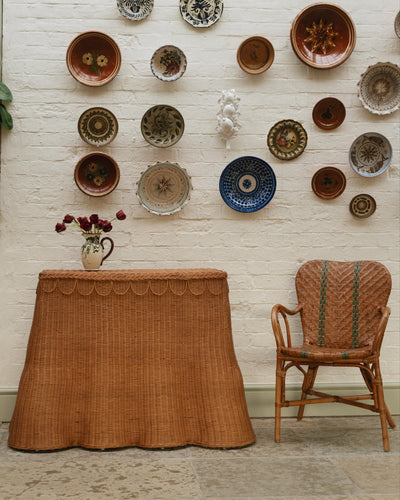The moment I found out I was pregnant with our daughter in early 2017, I suddenly saw the world in a completely new way. In the blink of an eye, everything went from being about myself and what I cared about in the moment, to being about her and her future. There were things I always knew were important, like natural ingredients in food and products, reducing plastic use, and recycling – but when I knew we were bringing a little person into the world, it finally made sense how important all these things really were. I wanted her to live and thrive in a world that is safe, clean, and beautiful.
At this point, you guys might’ve heard about the ‘Zero Waste’ movement, which has been gaining some traction in recent years. It’s a philosophy that encourages reducing and eliminating waste so that no resources are ever sent to a landfill. It also encompasses a few other lifestyle philosophies, like plastic-free living, which I’m incredibly interested in. I’ve read stories about families who somehow managed to fit their entire year’s worth of rubbish into a small jar. If this seems intense and unachievable, I hear you. At this point in our family, I’m not sure it’s realistic for us to be 100% waste-free. However, in 2019 I wanted to take some conscious steps towards reducing waste and eliminating plastic as much as possible from our home. Imagine if we all made a few small changes, what a massive difference it would make on our environment – not to mention all the wonderful health benefits!
So why is reducing waste and eliminating plastic from your household important? For one, landfills are toxic and unsustainable. According to studies, landfills are responsible for 20% of the methane emissions in the US. Toxins from non-biodegradable products (including nasty things like batteries and cleaning chemicals) leach into our soils and groundwater when it rains. And just like plastic, eventually ends up in our oceans. It touches every area of our lives, from agriculture, even to our drinking water. What’s worse, is that plastic products we use in our homes often contain chemicals that are harmful to our health. Plastic containers often contain toxins that mimic estrogen, which can cause reproductive harm and infertility in men and women. According to studies, babies are extra susceptible to harmful chemicals – so scary. So with all of this information at hand, I’m more ready than ever to do what I can for our environment and our home.
Here are some quick, easy, and achievable ways to create a greener, cleaner household in 2019:
1. Just Say No.
When you’re out shopping, eating a restaurant, or ordering a coffee, say no to plastic straws, utensils, single-use containers, and bags. This might mean carrying metal straws or a reusable flatware set in your purse, a refillable thermos (for both hot and cold drinks), and reusable bags in your car. A lot of places like LA, and most of the UK, have eliminated plastic bags from grocery stores at checkout, but plastic bags are still widely used in the produce section. Try these reusable mesh bags instead. There are now even washable, reusable silicon zipper storage bags to replace your standard one-time use bags for storing leftovers and the like. Reducing your plastic/waste use takes some patience and effort, but making these small changes in your own life can have a huge impact.
2. Buy In Bulk.
Rice, quinoa, beans, and cereals are all available to buy in bulk at most grocery stores. Not only will you avoid buying one use containers, but you’ll save money as well! Even aluminium cans – while recyclable – add to the world’s waste. The problem is that our rate of recycling can’t keep up with our consumption, so many recyclable products still end up in landfills. Reuse old glass jars from things like pasta sauce and coconut oil to store products. I also love chic airtight jars, which will save space in your cabinets but are pretty enough to leave out on your counter.
3. Buy Green Products.
One of the biggest ways we can make a global impact is with our spending power. So many companies have had to change their practices based on what consumers demand – from removing BPA to ending animal testing, and more. If we are conscious of how we choose to spend, brands will have to keep up with the demand. Invest in companies and products that are green, clean, and ethical. I’ve just discovered Ecover, which is an amazing European brand that sells environmental products in safe, 100% recycled and recyclable containers that can be refilled (which is an important feature in reducing waste and plastic consumption). They make effective and useful everyday items, like laundry and dish detergents, hand soap, household cleaners and more. We particularly love their Washing Up Liquid – it’s made of clean packaging, safe ingredients, and is super effective, which is super important as a busy mum. Most importantly, it’s made out of plant-based ingredients and there are no phosphates or petrochemicals. The same goes for personal items that we use on our bodies. For Honor, we always use bath and body products on that are natural and baby safe, and I’ve also started testing out tons of natural ingredient beauty products to cut down on toxins for myself.
4. Buy Local.
Mackenzie and I have always been huge fans of the farmer’s market, and now that we’re making an effort to be more green, it’s an even bigger lifesaver. Not only do you have access to a variety of organic, local ingredients, but items usually always come loose, or wrapped in paper – rather than plastic containers like in the grocery store. If you don’t have a farmer’s market, buy things like meat, fish, and cheese from the deli section of your grocery store instead. It might be a little more expensive, but it won’t come in a pre-packaged container – and I consider the slight extra cost to be worth it. Plus, if you’re saving money on bulk items, the cost evens out. I also find that when we buy fresh ingredients from the farmer’s market or deli, we tend to make them right away or within a few days (rather than have them sit in a container at the back of the fridge), which helps to avoid food going bad and being thrown out.
5. Educate Others.
Kindly, and gradually. We need everyone to contribute if we’re really going to make a difference. Rather than lecturing people on what you know, kindly introduce information to your friends, families, and coworkers. Whether it’s the Texas-sized garbage island swirling about in the ocean, or the risks of infertility caused by plastics, there are plenty of scary statistics to share that affect us all, whether we like it or not. But always do it kindly, and without judgment, if people aren’t quite yet ready to join in. Better yet, lead by example. Once people see you making small changes and how easy it is, they might be inspired to do the same.
Please feel free to share the ways you’re going green this year, I’d love to hear more in the comments!
















